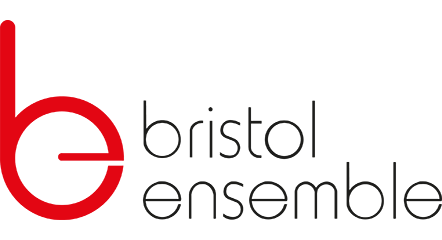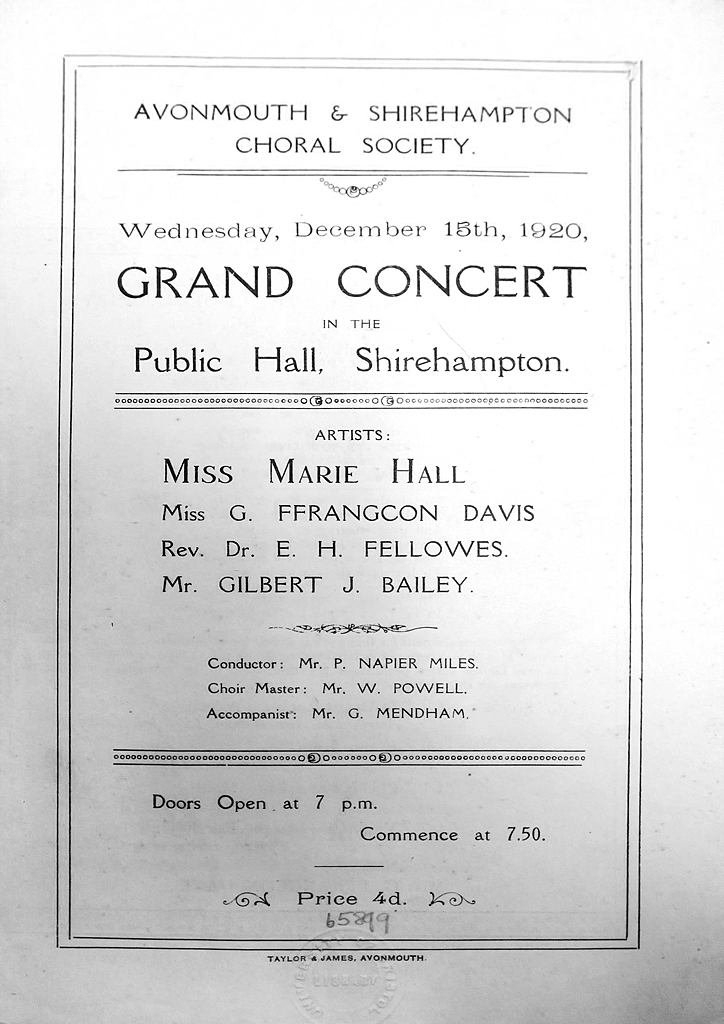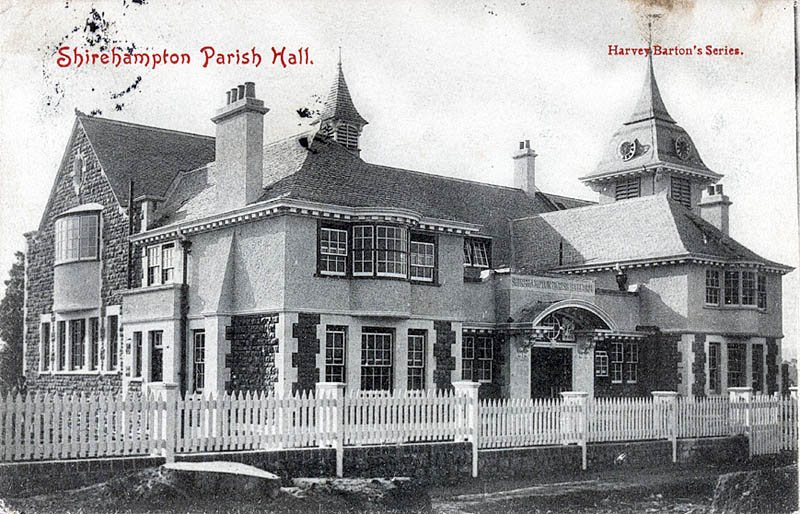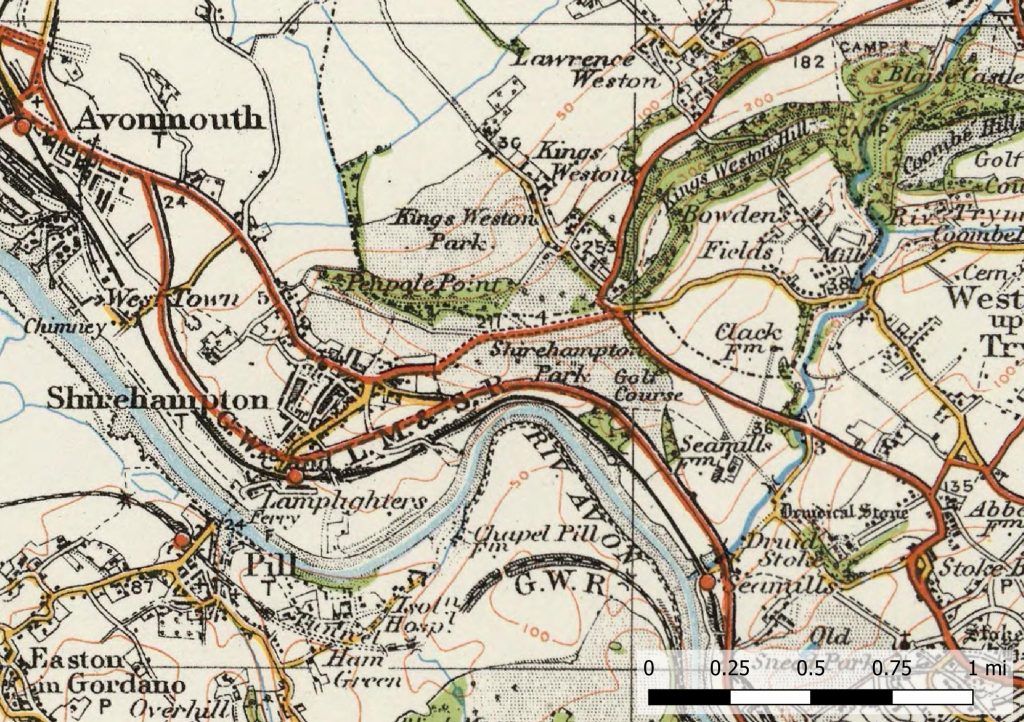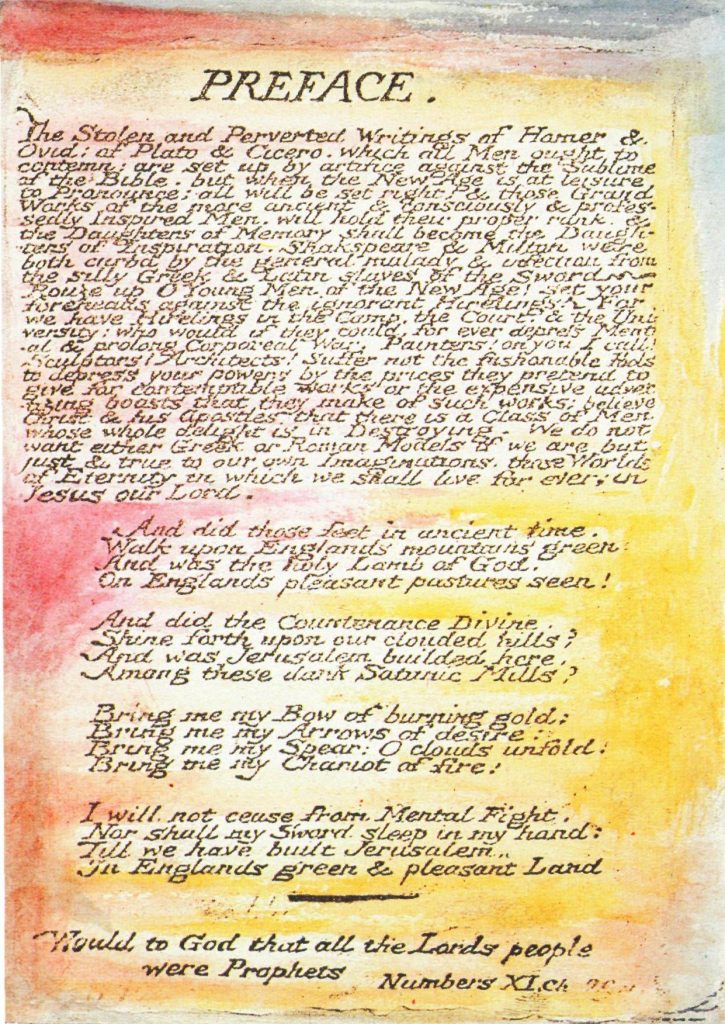Vaughan Williams’ The Lark Ascending was first performed, in a version for violin and piano, at Shirehampton Public Hall on 15th December 1920. This page gives details of that concert, based on the original programme, which is held in the Philip Napier Miles Archive in Bristol University Library.
Click the links on the transcript of the programme below to find out more…
AVONMOUTH & SHIREHAMPTON
CHORAL SOCIETY
Wednesday, December 15th, 1920
GRAND CONCERT
IN THE
Public Hall, Shirehampton
ARTISTS:
Miss MARIE HALL
Miss G. FFRANGCON DAVIS
Rev. Dr. E. H. FELLOWES
Mr. GILBERT J. BAILEY
Conductor: Mr. P. NAPIER MILES
Choir Master: Mr. W. POWELL
Accompanist: Mr. G. MENDHAM
Doors Open at 7 p.m.
Commence at 7.50.
Price 4d
TAYLOR & JAMES, AVONMOUTH
PROGRAMME
1. FANTASIA ON CHRISTMAS CAROLS: R. Vaughan Williams
Mr. GILBERT J. BAILEY & THE CHORAL SOCIETY
Violoncello Obligato: Miss HELEN JUST
2. VIOLIN SOLO “The Lark Ascending”: R. Vaughan Williams
FIRST PERFORMANCE
Romance for Violin and Orchestra.
Miss MARIE HALL
“He rises and begins to round,
He drops the silver chain of sound
Of many links without a break,
In chirrup, whistle, slur and shake.
For singing till his Heaven fills,
‘Tis love of earth that he instils,
And ever winging up and up
Our valley is his golden cup,
And he the wine which overflows
To lift us with him as he goes,
Till lost on his aerial rings
In light, and then the fancy sings.”
George Meredith.
The accompaniment for this work is scored for strings, woodwind, and two horns. The pianoforte version has been made by the Composer himself, who has very kindly given permission for the work to be performed without Orchestra on this occasion.
3. SONGS
(a) “O Death Rock me Asleep”: Ascribed to Ann Boleyn, 1536, ed. Dolmetsch
(b) “Come Again”: Dowland 1597, ed. Fellowes
(c) “Phyllis was a Faire Maid”: Giles Earles, 1615, ed. Keel
(d) “Virgins are like the Fair Flowers”: Purcell, arranged by F. Austin
(e) “Names”: P. Napier Miles
Miss G. FFRANGCON DAVIS
4. CONCERTO FOR TWO VIOLINS: Bach
(a) Vivace
(b) Largo, Ma Non Tanto
(c) Allegro
Miss MARIE HALL & Rev. Dr. E. H. FELLOWES.
5. ODE ON ST. CECILIA’S DAY: C. Hubert H. Parry
Miss G. FFRANGCON DAVIS, Mr. GILBERT J. BAILEY, & THE CHORAL SOCIETY.
6. CHORAL SONG “Jerusalem”: C. Hubert H. Parry
THE CHORAL SOCIETY.
And did those feet in ancient time
Walk upon England’s mountains green?
And was the holy Lamb of God
On England’s pleasant pastures seen?
And did the Countenance Divine
Shine forth upon our clouded hills?
And was Jerusalem builded here
Among these dark Satanic Mills.
Bring me my bow of burning gold!
Bring me my arrows of desire!
Bring me my spear! O clouds, unfold!
Bring me my chariot of fire!
I will not cease from mental fight,
Nor shall my sword sleep in my hand,
Till we have built Jerusalem
In England’s green and pleasant land.
The following sections give further details about the items mentioned on the programme:
AVONMOUTH & SHIREHAMPTON CHORAL SOCIETY
The Avonmouth and Shirehampton Choral Society was founded in 1905, shortly after the opening of its home, the Shirehampton Public Hall. Its aim was “to encourage the study of good music in the neighbourhood”, and was supported by enthusiastic local volunteers. Philip Napier Miles, squire of Kings Weston – who funded the construction of the hall – was the Choral Society’s Honorary Conductor. His friend Ralph Vaughan Williams first visited in November 1914, to conduct his setting of Three Elizabethan Songs.
The Society gave regular concerts at the hall. After a respite during the war, they resumed in 1919. In 1924 the Society presented Napier Miles with an ivory and gold conductor’s baton. There do not appear to be any mentions of the Society in the press after 1926, and it is unclear what happened to it.
Back to programme (title page)
Wednesday, December 15th, 1920
The Air Ministry weather reports recorded heavy snowfall across the south of England on 11th December, which lay on the ground for several days. With high pressure over Scandinavia and a cold easterly wind, the evening of 15 December 1920 would have been cold and cloudy but dry, with snow on the ground. Perfect for a Christmas concert!
The front page of The Daily Mirror on 15 December 1920 was taken up with pictures of a London-Paris passenger plane that had crashed at Golders Green the previous day, killing four people.
Meanwhile, the Western Daily Press, as well as national and international stories, and many classified advertisements, reported on local news, including a visit to Bristol by the Chancellor of the Exchequer, Austen Chamberlain; a robbery from John Bennett’s jewellery shop at College Green; problems with the water supply from the city’s “Ancient Conduits”; and the list of prizewinners at the “Winford Fat Cattle Show”. It also carried advertisements for (among others) “Tom, Tom, the Piper’s Son” at the Prince’s Street Theatre; “Seven Nights in London” at the Theatre Royal; “Pretty Peggy” at the Bristol Hippodrome; an organ recital by Hubert Hunt on the Grand Organ at the Colston Hall; and Ethel Clayton in the film “Men, Women and Money” being shown at the Victoria Rooms Cinema.
Back to programme (title page)
Public Hall, Shirehampton
Shirehampton Public Hall was built on land given by Philip Napier Miles, squire of Kings Weston, and opened by Mrs Sybil Napier Miles on 29 September 1904. Click here for a fuller history.
Today, the the hall is leased from Bristol City Council and managed by Shirehampton Public Hall Community Association. It continues to provide a range of events and facilities for the local community, including classes, leisure and exercise activities for all ages, concerts, exhibitions, and other meetings and events. The building also houses Shirehampton Public Library.
The following map – part of the Ordnance Survey 1″ Series, No.111 – was surveyed in 1913 and published in 1923. It shows Shirehampton, and neighbouring Avonmouth and Lawrence Weston, as small villages on the edges of the Kings Weston estate. Shirehampton Public Hall is about halfway along the yellow-coloured road north of the red dot marking Shirehampton railway station. Avonmouth had a single dock (just off the edge of the map), as Bristol was still the area’s main port.
Back to programme (title page)
Miss MARIE HALL
Newcastle-born Marie Hall (1884-1956) was one of the leading violinists of the first half of the 20th century. She was a protegée of Philip Napier Miles and the dedicatee of The Lark Ascending (even assisting Vaughan Williams in its composition), so was the obvious choice for the first performance. She later gave the premiere of the orchestral version at London’s Queen’s Hall on 14 June 1921.
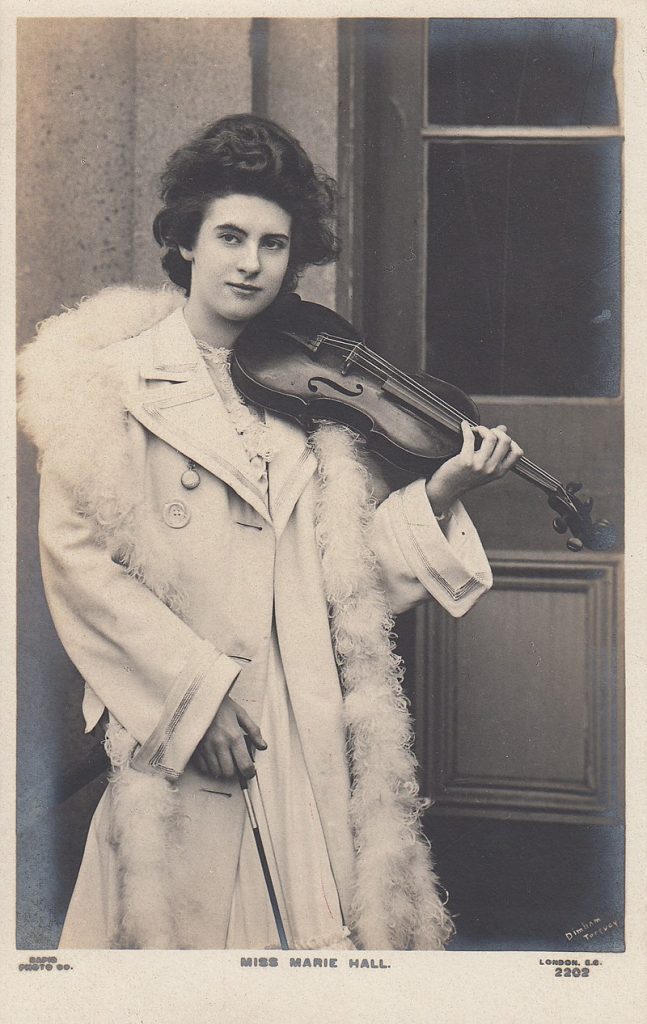
In 1920, Marie Hall was aged 34, married to her business manager Edward Baring, and had a daughter, Pauline. They were living in Cheltenham. Click here for a fuller biography.
Here she is playing four short pieces, recorded in 1924.
Marie Hall played a Stradivarius violin made in 1709 and previously owned by the great Italian violinist Giovanni Battista Viotti. It is now known as the “Marie Hall, Viotti” and is owned by the Chi-Mei Culture Foundation in Taiwan.
Back to programme (title page)
Miss G. FFRANGCON DAVIS
Gwen Ffrangcon-Davies (1891-1992) (misspelt “Davis” on the programme) was a singer and actress. She performed the group of songs in this concert, and was one of the soloists in Parry’s Ode on St Cecilia’s Day.
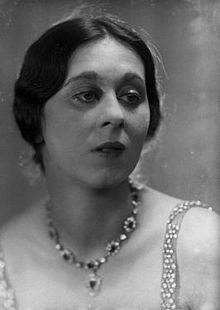
She was born in London to a Welsh family. In 1924, she played Juliet to John Gielgud’s Romeo, and went on to have an acting career spanning 80 years.
She appeared twice on Desert Island Discs, in 1962 and 1989. On both occasions she selected Bach’s concerto for two violins – one of the works played at Shirehampton on 15 December 1920.
Here she is in 1983 looking back on her career.
She was made a Dame Commander of the Order of the British Empire (DBE) in 1991, in the year she reached 100.
Back to programme (title page)
Rev. Dr. E. H. FELLOWES
Edmund Horace Fellowes (1870-1951) was an accomplished violinist, playing with Marie Hall in Bach’s Concerto for Two Violins in this programme. He also knew Vaughan Williams, the two sharing an interest in English hymns.
He was well-known for promoting the revival of 16th and 17th century English music. He edited many volumes of madrigals, lute songs, and the music of William Byrd and others. He also wrote a History of Winchester Cricket, after his old school.
He was born in London, and showed musical talent from an early age. He became Precentor of Bristol Cathedral in 1897, and then a canon of St George’s Chapel Windsor from 1900-1951. He was in charge of the choir there for several years. Here he is conducting the Choir of St George’s Chapel Windsor in 1924.
Back to programme (title page)
Mr. GILBERT J. BAILEY
Gilbert Jeffrey Bailey (1895-1965) was born in Chesterton, Oxfordshire. He achieved some success as a baritone, but also played the piano. In this concert, he was the soloist on Vaughan Williams’ Fantasia on Christmas Carols, and one of the soloists in Parry’s Ode on St Cecilia’s Day.
He was an advocate of British music, and was said to have “unusually clear articulation”. He seems to have been a regular at Avonmouth and Shirehampton Choral Society concerts in the early 1920s.
He went on to work for the BBC and was the originator of the wireless Old Time Singers. He appeared in opera at Covent Garden and elsewhere, and was in The Bartered Bride with Sadler’s Wells Opera in 1944. He died in London in 1965.
Back to programme (title page)
Mr. P. NAPIER MILES
Philip Napier Miles (1865-1935) was last Squire of Kings Weston, a great philanthropist and a prominent amateur musician in Bristol. He studied under Hubert Parry and was a friend of Vaughan Williams (both of whom featured in this concert). He built the Shirehampton Public Hall and founded the Avonmouth & Shirehampton Choral Society, of which he was Honorary Conductor.
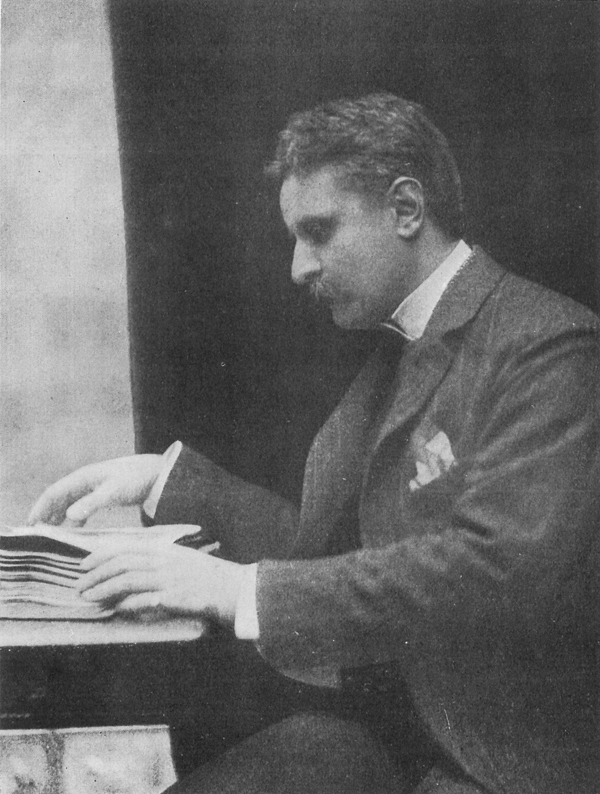
Click here for a detailed biography.
Napier Miles was a talented amateur composer and many of his works (including several operas) are held in the Philip Napier Miles Archive at Bristol University Library. One of his short songs – “Names” – was on the programme on 15 December 1920.
Back to programme (title page)
Mr. W. POWELL
William Powell (1872?-1937?) was the choirmaster of the Avonmouth & Shirehampton Choral Society. Not much is known about him, but he seems to have been a schoolmaster, and was probably Headmaster of Avonmouth C of E School in 1918. He founded the Avonmouth Old Boys Rugby Club in 1897, which indicates that he had probably gone to Avonmouth School himself. In 1933 he founded the Avonmouth Bowling Club.
It is possible that he was born in Porlock in 1872, and died in Bristol in 1937 aged 64.
Back to programme (title page)
Mr. G. MENDHAM
Geoffrey Leonard Mendham (1899-1984) was the piano accompanist at this concert.
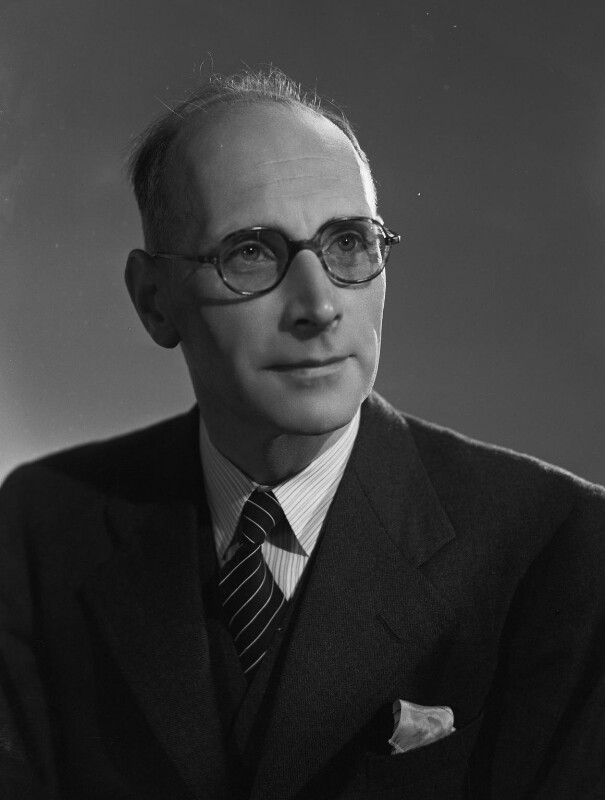
He was born in Clifton. He was a chorister at Bristol Cathedral, then attended Bristol Grammar School from 1914-16, and served in the Army Training Reserve, 92nd Battalion.
After the war, he was Assistant Organist at Bristol Cathedral from 1920 to 1941, and was a regular accompanist at Avonmouth & Shirehampton Choral Society concerts. He was Assistant Music Master at Clifton High School for Girls (1927-34), Music Master at Bristol Cathedral School and then at Clifton College, and later became Assistant Director of Music at Harrow School (1941-59).
Back to programme (title page)
Price 4d
The ticket price of four pence is equivalent to around 50p-75p in today’s money (depending on how you calculate it). Even in 1920, this was cheap, and perhaps indicates that the concert was subsidised by Napier Miles for the local Shirehampton community.
In comparison, the same day, the Western Daily Press (which cost 1d) was advertising an organ recital at the Colston Hall by Hubert Hunt, organist of Bristol Cathedral. Ticket prices for that concert ranged from nine pence up to 3s 6d (i.e. 42 pence) for seats in the “Grand Tier Circle”.
Back to programme (title page)
TAYLOR & JAMES, AVONMOUTH.
Taylor & James of Avonmouth printed the programmes. We have not been able to find out anything about them. They do not appear to be connected to Taylor Brothers of Bristol. They were still operating in 1949.
Back to programme (title page)
R. Vaughan Williams
Ralph Vaughan Williams (1872-1958) is among the greatest and most popular of British composers. Click here for a full biography.
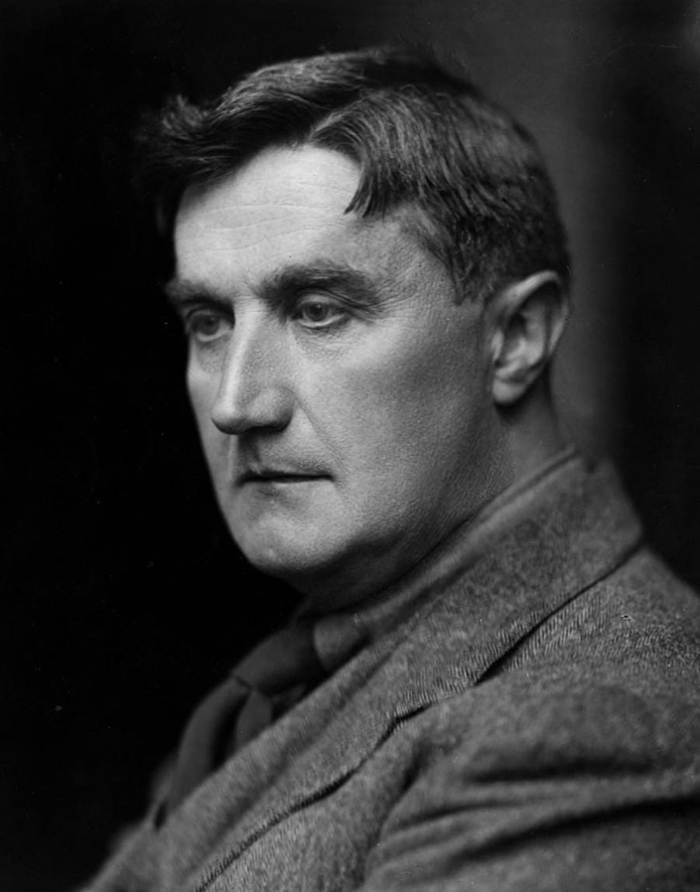
Vaughan Williams was a friend of Philip Napier Miles, who championed his music. It is unclear when the men first met, although they would have moved in the same musical circles, and would both have known Hubert Parry at the Royal College of Music in the 1890s.
Vaughan Williams first visited the Avonmouth and Shirehampton Choral Society in November 1914. That same year, he had started work on The Lark Ascending, but was interrupted by the war. He served with the Royal Ambulance Medical Corps and the London Field Ambulance, and was involved in the Battle of the Somme. In France in 1918 he was appointed Director of Music for the First Army of the British Expeditionary Force. The Lark Ascending was revised and completed in 1920, with the close collaboration of its dedicatee, Marie Hall.
Back to programme (first half)
FANTASIA ON CHRISTMAS CAROLS
Vaughan Williams’ Fantasia on Christmas Carols was first performed in Hereford Cathedral at the 1912 Three Choirs Festival. It is scored for baritone, SATB chorus and a reasonably large orchestra (2.2.2.2 – 4.2.3.1 + perc, org, str) – although there is also a piano arrangement (with optional solo cello part), which is the version that would have been played at this concert. Click here for the score.
It is a single movement work in three sections, lasting about 12 minutes.
Here is a performance of the full orchestral version.
Back to programme (first half)
Miss HELEN JUST
Helen Beatrice Mary Just (1904-1989) played the obbligato cello part in Vaughan Williams’ Fantasia on Christmas Carols.
She was born in Bristol, and was aged just 16 for this concert, although she had been performing in public since at least the age of ten, according to a review in the Western Daily Press. She later became the cellist of the English String Quartet, and a professor at the Royal College of Music. The RCM still awards a “Helen Just & Susan Connell Prize” for chamber music. She was still performing as late as 1971.
She married the cellist Ivor James (1882-1963) in 1928, having previously been his student. She died in 1989 in London.
Back to programme (first half)
VIOLIN SOLO “The Lark Ascending”
Vaughan Williams started writing The Lark Ascending in 1914, but he was interrupted by the war, and revised and finished the piece in 1920. It was always intended as a “Romance for Violin and Orchestra”, but the premiere in Shirehampton was, as the programme notes, “the pianoforte version … made by the Composer himself, who has very kindly given permission for the work to be performed without Orchestra on this occasion.” The work was played directly from Vaughan Williams’ manuscript score. It lasts about 15 minutes.
The work was dedicated to Marie Hall, who helped Vaughan Williams with the revisions (Vaughan Williams was also a violinist). At the top of the score are the opening lines of George Meredith’s poem The Lark Ascending (see below). Click here for the score.
The Lark Ascending is one of Britains most popular classical works, having several times been voted top of the Classic FM Hall of Fame.
Click here to see a previous performance at Shirehampton Public Hall of the version for piano and violin, given in 2012.
Back to programme (first half)
The Lark Ascending by George Meredith
The twelve lines of verse quoted in the programme, and reproduced at the top of the published score, are from a much longer poem, “The Lark Ascending”, by George Meredith (1828-1909), which first appeared in The Fortnightly Review in May 1881.
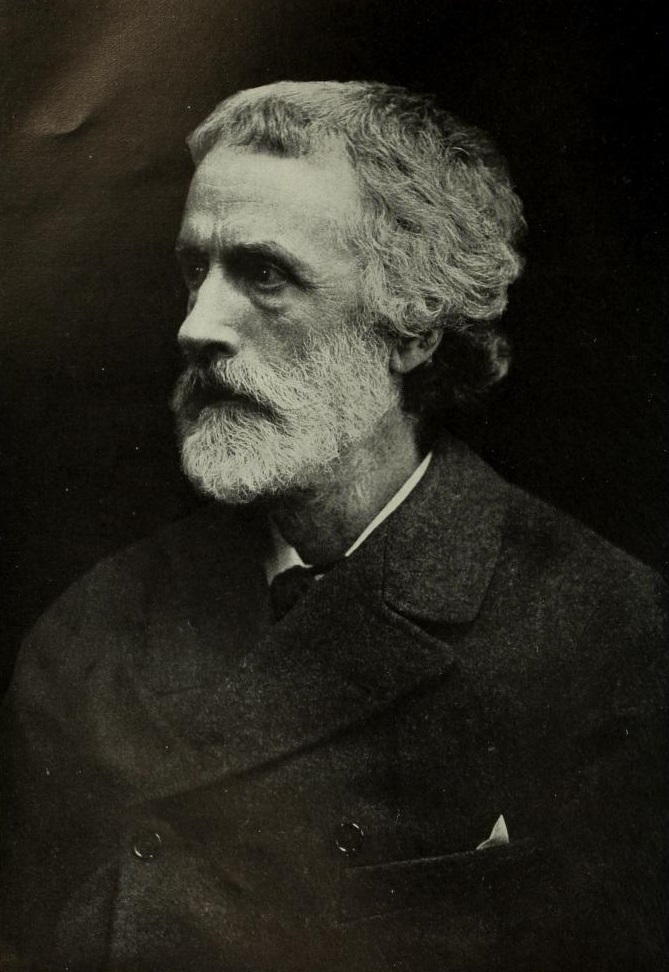
Siegfried Sassoon called the poem matchless of its kind, “a sustained lyric which never for a moment falls short of the effect aimed at, soars up and up with the song it imitates, and unites inspired spontaneity with a demonstration of effortless technical ingenuity… one has only to read the poem a few times to become aware of its perfection”.
Click here for a biography of George Meredith.
Back to programme (first half)
“O Death Rock me Asleep”
This slow lament, the first of the set of five songs closing the first half of the concert, is attributed to Anne Boleyn – supposedly written as she was awaiting execution in the Tower of London in 1536. It was transcribed by Arnold Dolmetsch from a lute tablature version from 1611, and published in his Select English Songs and Dialogues of the 16th and 17th Centuries (Boosey, 1898).
There is some uncertainty over whether it was really written by Anne, as discussed in this article. The words of the song are as follows (sources for the original poem vary slightly, and some have four or just two verses):
O Death rock me asleep,
Bring me to quiet rest,
Let pass my weary guiltless ghost,
Out of my woeful breast.
Toll on the passing bell,
Ring out the doleful knell,
Let the sound my death tell,
For I must die,
There is no remedy,
For now I die.
Alone in prison strong,
I wail my destiny,
Woe worth this cruel hap that I
Should taste this misery.
Toll on the passing bell, etc
Farewell my pleasures past,
Welcome my present pain,
I feel my torments so increase,
That life cannot remain.
Cease now the passing bell,
Rung is my doleful knell,
For the sound my death doth tell.
Death doth draw nigh,
Sound my end dolefully,
For now I die.
Back to programme (first half)
“Come Again”
Come Again! Sweet Love doth now Invite is a lute song written by John Dowland (1563-1626), and published in his First Book of Ayres in 1597. These were edited by Edmund Fellowes and republished (with a piano arrangement of the lute tablature) by Stainer & Bell in 1920, so would have been seen as an exciting new discovery at the time of this concert. Click here for the score.
The words are believed to have been written by Dowland himself:
Come again!
Sweet love doth now invite
Thy graces, that refrain
To do me due delight,
To see, to hear, to touch, to kiss, to die
With thee again in sweetest sympathy.
Come again!
That I may cease to mourn,
Through thy unkind disdain.
For now left and forlorn,
I sit, I sigh, I weep, I faint, I die
In deadly pain and endless misery.
All the day
The sun that lends me shine
By frowns do cause me pine,
And feeds me with delay;
Her smiles my springs that makes my joys to grow;
Her frowns the Winters of my woe.
All the night
My sleeps are full of dreams,
My eyes are full of streams;
My heart takes no delight
To see the fruits and joys that some do find,
And mark the storms are me assigned.
Out alas!
My faith is ever true;
Yet will she never rue,
Nor yield me any grace.
Her eyes of fire, her heart of flint is made,
Whom tears nor truth may once invade.
Gentle Love,
Draw forth thy wounding dart,
Thou canst not pierce her heart;
For I, that do approve
By sighs and tears more hot than are thy shafts,
Did tempt, while she for mighty triumphs laughs.
Here is a performance by tenor and guitar.
Back to programme (first half)
“Phyllis was a Faire Maid”
Not much is known about Giles Earle (fl. 1615), who was an English poet, composer, and collector of songs, best known for his manuscript collection Giles Earle his Booke dated 1615, in which Phyllis (or Phillis) was a Faire Maid can be found.
It is believed that Earle wrote the words as well as the music – or at least the first verse (see below):
Phillis was a faire maide and she had suitors store;
though I a maide, as Phillis was, yet have I ne’er the more.
A sillie lass may sigh, alas! whose cause doth still abound.
I daily weep, and keep my sheep that feede upon the downe.
Phillis was a faire maide, belov’d of Corydon;
yet I a maide, as Phillis was, must ever pine alone.
No lover may, with garlands gay, my shining tresses crown.
I daily weep, and keep my sheep that feede upon the downe.
Phillis was a faire maide and Corydon was kind;
but I a maide, as Phillis was, may never suitor find.
The seasons pass and oh! alas, my sorrows yet abound.
I daily weep, and keep my sheep that feede upon the downe.
The score does not seem to be available online. The version sung at the concert was included in Volume 1 of Elizabethan Love Songs, edited by Frederick Keel, and published by Boosey in 1909. It is a cheerful ditty in 4/4 time, marked Allegretto. A note to the score says that “the first verse only is found in the MS: the remaining verses are added by Mr Percy Pinkerton.” Percy Edward Pinkerton (1855-1946) was an English translator and poet.
Back to programme (first half)
“Virgins are like the Fair Flowers”
Although the programme attributes this song to Henry Purcell (1659-1695), it actually comes from Act I of the Beggar’s Opera by John Gay (1685-1732), published in 1728. Gay, or his musical collaborator Johann Christoph Pepusch (1667-1752), stole the tune from a different song by Purcell (“What shall I do to show how much I love her?” from his opera The Prophetess, or the History of Dioclesian, published in 1691).
Frederic Austin’s production of The Beggar’s Opera enjoyed a very successful run at the Lyric Theatre Hammersmith in 1920. Austin himself played Peachum. Virgins are like the Fair Flower is sung by Peachum’s daughter Polly, played by Sylvia Nelis (1887-1973).
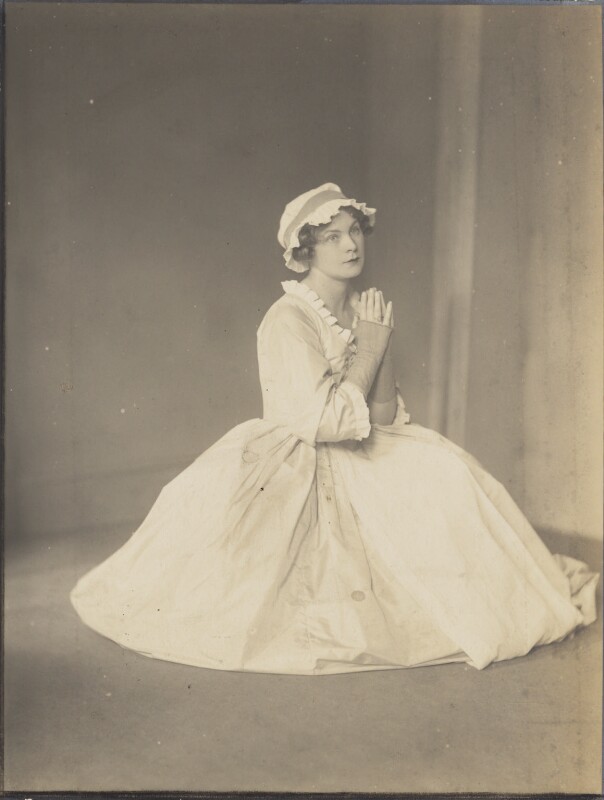
The full score was published that year, in time for the Shirehampton concert. Interestingly, the very next song is a duet entitled Our Polly is a sad slut, so the picture above is perhaps somewhat deceptive! The full score is available here (see pages 14-15).
John Gay’s words are as follows
Virgins are like the fair flower in its luster,
Which in the garden enamels the ground;
Near it the bees play flutter and cluster,
And gaudy butterflies frolic around.
But, when once plucked, ’tis no longer alluring,
To Covent Garden ’tis sent (as yet sweet),
There fades, and shrinks, and grows past all enduring,
Rots stinks, and dies, and is trod under feet.
Here is a recording from the 1992 RSC revival, which is reasonably faithful to Austin’s version of the song.
Back to programme (first half)
“Names”
Having started the set of five songs in sombre mood, gradually getting more lively, the first half of the concert ended with one of Philip Napier Miles’ own compositions.
Names is Napier Miles’ Op.13, No.2, and is dedicated to Geoffrey Mendham (who played the piano for the performance at this concert). It is a setting of words by Samuel Taylor Coleridge (1799):
I ask’d my fair one happy day,
What I should call her in my lay;
By what sweet name from Rome or Greece;
Lalage, Neaera, Chloris,
Sappho, Lesbia, or Doris,
Arethusa or Lucrece.
‘Ah!’ replied my gentle fair,
‘Belovéd, what are names but air?
Choose thou whatever suits the line;
Call me Sappho, call me Chloris,
Call me Lalage or Doris,
Only, only call me Thine.’
It was written between 11th and 17th May 1920 at Napier Miles’ Villa “Costa Bella” in Alassio, on the Italian coast not far from Monaco. (Villa Costabella still exists at 42/44 Via Adelasia, on the road towards Moglio on the hill behind Alassio).
Bristol University Library has two manuscript copies of the song, one of which seems to be a fair copy of the other, with a few small (mainly rhythmic) alterations in the piano part, and tidying up some of the notation. Names was never published, although its sister song Op.13 No.1 “My master hath a Garden” was published on its own by Oxford University Press in 1933.
It is a relatively short song – 29 bars, allegretto – and lasts about a minute. It is in an irregular 3/4 and 4/4 metre, and has a folk-song like feel to it. Compared to the simple accompaniments of the first four songs, Names has a more challenging piano part, with plenty of extended semiquaver arpeggios and wide leaps, finishing with four bars of pianistic flourish that lead to a fortissimo high F major chord to bring the first half of the concert to a close. Cue applause!
It is unclear whether Names has been performed since December 1920. However, H C Colles, in his article about Napier Miles in Music & Letters (October 1936, pp.357-67), says about the songs: “In them appears the true art of the musical miniaturist, and if posterity should be content to leave the weightier scores lying on the shelf, it can hardly fail to gather a bouquet from such blooms as ‘Names’ (Coleridge)…”.
Back to programme (first half)
CONCERTO FOR TWO VIOLINS
Opening the second half of the concert, the Concerto for Two Violins in D Minor, BWV 1043, by Johann Sebastian Bach (1685-1750) was written in Leipzig around 1730 and remains one of the composer’s most popular works. It lasts about 15 minutes.
Although scored for string orchestra, there are also several arrangements with piano accompaniment, one of which would have been performed at this concert. Several versions of the score (including two pre-1920 piano versions) are available here.
Here is a performance of an arrangement for two violins and piano.
Back to programme (second half)
ODE ON ST. CECILIA’S DAY
Charles Hubert Hastings Parry (1848-1918) was a talented composer and, perhaps more importantly, an influential teacher at the Royal College of Music, where he taught from its inception in 1883, and which he led after Charles Villiers Stanford’s retirement in 1895 until his death. He taught composition to both Ralph Vaughan Williams and Philip Napier Miles. Click here for a longer biography.
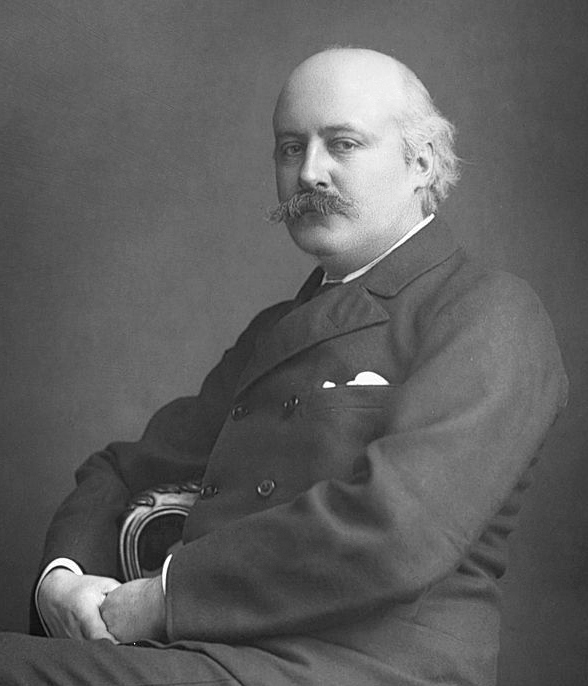
Parry’s Ode on St Cecilia’s Day is the most substantial work on this programme, lasting about 40 minutes. The original is scored for soprano and baritone soloists, SATB chorus and orchestra, but there is also a version with piano accompaniment, which would have been performed at this concert. The vocal score (with piano) is available here.
The words of the Ode were written in 1708 by Alexander Pope (1688-1744). The full text is available here.
St Cecilia is the patron saint of musicians. Her day is 22 November.
Back to programme (second half)
CHORAL SONG “Jerusalem”
Jerusalem is undoubtedly Hubert Parry’s best-known work, a staple of the Last Night of the Proms, and a strong contender to be the de facto national anthem of England.
It is a setting of a poem written around 1804 by William Blake, and included in the preface to his epic Milton: A Poem in Two Books.
Parry wrote Jerusalem in 1916 and it became instantly popular, being adopted by the movement for women’s suffrage the following year (and later becoming the anthem of the Women’s Institute). Parry’s original setting is for unison voices which follow the top line of the accompaniment – making it straightforward for singing – with an organ accompaniment (also playable on the piano). This would have been the version played at this concert (Edward Elgar’s lush orchestration, which is the most familiar version today, did not appear until 1922). The original score is available here. And here is a performance of it by choir and organ.
A newspaper review of another Avonmouth & Shirehampton Choral Society Concert in 1921 mentions that it too finished with Jerusalem, so it may well have been a regular feature at these concerts. The fact that the words were included in the programme might indicate that the audience could join in if they wished.
